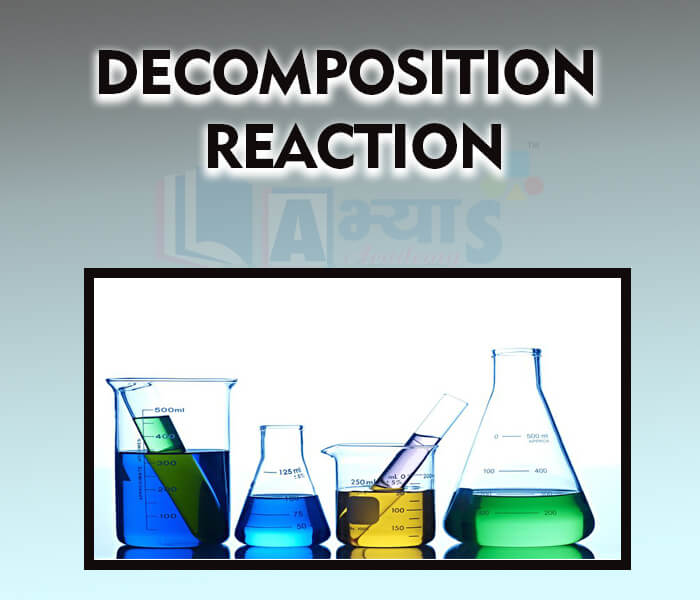Decomposition Reaction












Decomposition Reaction
Decomposition Reaction:
A reaction in which a single reactant breaks down to form two or more products,is known as decomposition reaction. This reaction is opposite to combination reaction. On the basis off the form of energy required for the reaction, these reactions are of three types:
(i) Thermal decomposition
These reactions use the energy in the form of heat for decomposition of the reactant, e.g.
(a) Calcium carbonate on heating, decomposes to give calcium oxide and carbon dioxide. Calcium oxide is used for manufacturing of cement.
Calcium carbonate Calcium oxide + Carbon dioxide
(Limestone) (Quick lime)
Which of the following are correct ? (a) Photo chemical reaction involves the use of light energy for the purpose of decomposition . (b) When silver chloride is exposed to light, it decomposes to give silver metal and chloride gas. (c) Digestion of food in our body is also a decomposition reaction. | |||
| Right Option : D | |||
| View Explanation | |||
Calcium oxide is used for manufacturing of cement is formed using ______________ . | |||
| Right Option : A | |||
| View Explanation | |||
Which of the following are correct ? (a) Electrolysis reaction involves the use of electrical energy for the decomposition of the reactant molecules . (b) When electric current is passed through water, it decomposes to give oxygen and hydrogen. (c) When electric current is passed through molten sodium chloride, it decomposes to give sodium metal and chlorine gas . | |||
| Right Option : D | |||
| View Explanation | |||
Students / Parents Reviews [10]
It was good as the experience because as we had come here we had been improved in a such envirnment created here.Extra is taught which is beneficial for future.

Eshan Arora
8thMy experience with Abhyas academy is very good. I did not think that my every subject coming here will be so strong. The main thing is that the online tests had made me learn here more things.

Hiya Gupta
8thMy experience was very good with Abhyas academy. I am studying here from 6th class and I am satisfied by its results in my life. I improved a lot here ahead of school syllabus.

Ayan Ghosh
8thI have spent a wonderful time in Abhyas academy. It has made my reasoning more apt, English more stronger and Maths an interesting subject for me. It has given me a habbit of self studying

Yatharthi Sharma
10thAbhyas is a complete education Institute. Here extreme care is taken by teacher with the help of regular exam. Extra classes also conducted by the institute, if the student is weak.

Om Umang
10thIt was a good experience with Abhyas Academy. I even faced problems in starting but slowly and steadily overcomed. Especially reasoning classes helped me a lot.

Cheshta
10thOne of the best institutes to develope a child interest in studies.Provides SST and English knowledge also unlike other institutes. Teachers are co operative and friendly online tests andPPT develope practical knowledge also.

Aman Kumar Shrivastava
10thIt has a great methodology. Students here can get analysis to their test quickly.We can learn easily through PPTs and the testing methods are good. We know that where we have to practice

Barkha Arora
10thA marvelous experience with Abhyas. I am glad to share that my ward has achieved more than enough at the Ambala ABHYAS centre. Years have passed on and more and more he has gained. May the centre flourish and develop day by day by the grace of God.

Archit Segal
7thAbout Abhyas metholodology the teachers are very nice and hardworking toward students.The Centre Head Mrs Anu Sethi is also a brilliant teacher.Abhyas has taught me how to overcome problems and has always taken my doubts and suppoeted me.
